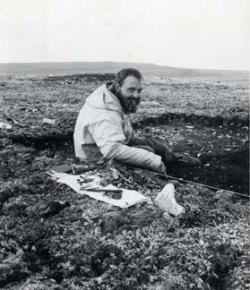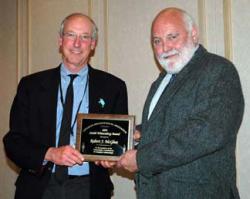

The Smith-Wintemberg Award is presented to honour members of the Canadian archaeological community who have made outstanding contributions to the advancement of the discipline of archaeology and to our knowledge of Canada's archaeological past. This, our Association's highest award, is presented in any year, as merited, to recognize outstanding achievement or service. This year the Smith-Wintemberg award, as unanimously approved by the executive, is awarded to Dr. Robert McGhee.
It is impossible to think about Arctic archaeology and not have the works and ideas of Robert McGhee at the forefront of your thoughts. Fellow of the Royal Society of Canada and the Arctic Institute of North America, and winner of the Royal Canadian Geographical Society's Massey Medal, Robert McGhee can be considered the most productive archaeologist to ever work in the Canadian Arctic, and one of the most eminent scholars that Canada has produced.
After earning the very first PhD in Archaeology from the University of Calgary in 1968, for his study of Copper Inuit Prehistory, he went on to become long time curator of Arctic Archaeology at the Canadian Museum of Civilization. During a career spanning more than four decades, Bob McGhee has written and rewritten the prehistory of Canada's Arctic region. Moreover, he has communicated the remarkable stories of Canadian archaeology and history with a talent for public writing that is without equal in the discipline.
It is difficult to summarize such a distinguished career, but what is perhaps most striking is the breadth of Bob's achievements. Within his major field of specialization, he has carried out research which is basic to every significant topic in Arctic Archaeology from the arrival of the first Palaeo-Eskimo over 4000 years ago to the historic era, and he has conducted field work throughout the Canadian Arctic from the Mackenzie Delta to the eastern High Arctic and southern Labrador. Moreover, he has communicated the results of this research through a scholarly publication record that is the envy of us all. In a classroom, or over a few beers in a bar, one could talk endlessly about his work on the migration of the ancient Inuit into Arctic Canada, the colonization of the Arctic Islands by the early Palaeo-Eskimo, the question of Dorset/Thule contact, or the origins of historic Central Inuit culture, to name but a few of the many topics to which Bob has contributed. But just as important, and perhaps more so, are his achievements in public writing. Bob took a bold step in 1976 in publishing Burial at L'Anse Amour, a poignant fictional account about a young boy's death based on work that he and Jim Tuck carried out at a Maritime Archaic site in Labrador. Then a series of articles were published under the volume titles: Ancient Canada and Canada Re-discovered, followed by the widely acclaimed books : Ancient People of the Arctic which examined the way of life of the Palaeo-Eskimo peoples, The Arctic Voyages of Martin Frobisher, and The Last Imaginary Place, a human history of the Arctic world. Written with eloquence and passion, these and other publications have resulted in a significantly broader public exposure to, and appreciation of, Canada's rich cultural past. Beyond his published works, Bob has curated many inspired exhibits, produced and scripted videos, and given countless public lectures – it is well known that a lecture by Robert McGhee is always worth the price of admission. In all his work Bob has challenged his colleagues to look beyond the stones and bones of Arctic Archaeology, as appealing as those are, to imagining the lives and motivations of Arctic peoples in the context of World history. By any account, and by all accounts, Robert McGhee is most deserving of this association's highest honour, the Smith-Wintemberg Award, and, to paraphrase Leonard Cohen, someday he will have earned a place in the "tower of song". Please join me in saluting the extraordinary career of Bob McGhee.
Jack Brink
Thunder Bay
May 16, 2009
